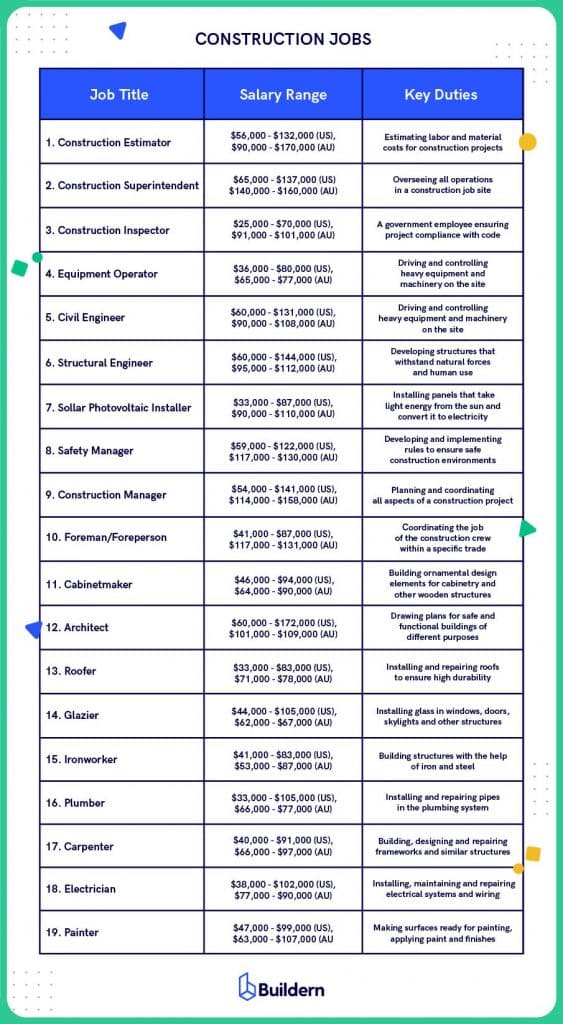Construction Career: 15+ Demanding and Rewarding Construction Jobs

What do you imagine when you think about construction? Hard hats, heavy machinery, and building materials may come to mind.
But there’s more to this industry than manual labor. It is an important constituent for scaling a construction business.
It’s a complex blend of project management, forecasting, communication, and other skills that make this world of creating new spaces and structures possible.
You can occupy any desired role in the construction industry based on your abilities and interests. Office-based positions are available, as are different levels of hands-on work.
In this blog, we collected 15+ different types of construction jobs for everyone to help you decide your next career move in this dynamic and exciting industry.

Construction Careers in Numbers
- Employment in construction is projected to reach about 1.7 million by 2026, where positions similar to general contractors (those responsible for the entire construction project) are among the most demanded.
- The global construction industry market is expected to grow with a CAGR of 7.3%, eventually reaching $17,247.96 billion by 2029.
- In 2024, new construction projects are expected to be valued at $1.23 trillion, among which residential and non-residential buildings have the largest share.
- Finally, around 300,200 more jobs are expected to be available in construction by 2029, opening wide employment opportunities for people of different skills and interests.
💡Recommended Reading
19 Construction Jobs that Will Satisfy Your Professional Goals and Personal Interests

Construction Estimator
Annual Salary Range: $56,000 – $132,000 (US), $90,000 – $170,000 (AU)
Key Duties: Estimating labor and material costs for construction projects
That’s a suitable construction career for you if you’re keen on numbers and have excellent analytical skills. Construction estimators determine the cost of a project before it starts, including estimating the quantity and price of materials, labor, equipment, and subcontractors needed to complete the job. Oftentimes, they visit the jobsite to gather information and work closely with other professionals such as architects, engineers, and contractors. Estimators present their forecasts to customers along with recommendations on how project costs can be reduced without compromising the quality of work.
Construction Superintendent
Annual Salary Range: $65,000 – $137,000 (US), $140,000 – $160,000 (AU)
Key Duties: Overseeing all operations in a construction job site
One of those types of construction jobs that require a physical presence in the jobsite is construction superintendents. They are responsible for managing the day-to-day operations on the site, coordinating with subcontractors and inspectors, and ensuring that the project is running on schedule and within budget. The responsibilities may vary, including daily scheduling, supervision of daily tasks and activities, and addressing on-site issues as they arise. These specialists are also responsible for maintaining safety and quality standards throughout the project.
Construction Inspector
Annual Salary Range: $25,000 – $70,000 (US), $91,000 – $101,000 (AU) in
Key Duties: A government employee ensuring project compliance with code
Acting as a quality control agent, construction inspectors work for local or state governments to ensure all building projects are up to code and adhere to safety regulations. Their job involves inspecting constructions during various stages of the project, reviewing plans and specifications, issuing permits and approvals, and reporting any violations or issues. They may also conduct final inspections before a project is completed, as well as provide recommendations for improvements or modifications to ensure compliance. As you may guess, this career in construction requires a lot of site visits.
Equipment Operator
Annual Salary Range: $36,000 – $80,000 (US), $65,000 – $77,000 (AU)
Key Duties: Driving and controlling heavy equipment and machinery on the site
It’s time to demonstrate your physical stamina and mechanical skills. Equipment operators are responsible for using heavy machinery such as bulldozers, excavators, and cranes to move materials, dig trenches, and prepare areas for construction. They must be skilled in operating various equipment safely and efficiently while following project plans precisely. It’s a physically demanding job that requires great focus and attention to detail. In addition to on-the-job training, many equipment operators also complete a formal training program to become certified.

Civil Engineer
Annual Salary Range: $60,000 – $131,000 (US), $90,000 – $108,000 (AU)
Key Duties: Designing, constructing and supervising infrastructure projects
As one of the most sought-after types of construction jobs, civil engineers are responsible for designing, constructing, and supervising infrastructure projects such as roads, bridges, tunnels, and water systems. They work closely with architects and other engineers to ensure that structures are built safely and efficiently. Civil engineers use advanced computer software to create models and simulations of their designs before starting construction. They also conduct site visits to monitor progress and address any issues that may arise during the project.
Structural Engineer
Annual Salary Range: $60,000 – $144,000 (US), $95,000 – $112,000 (AU)
Key Duties: Developing structures that withstand natural forces and human use
A narrowly specialized type of civil engineer, structural engineers are specifically trained to design and analyze structures that can withstand natural forces such as wind, earthquakes, and hurricanes. They work closely with architects to develop safe and functional designs for buildings, bridges, and other structures. Structural engineers must be proficient in using complex computer software to create simulations and models, as well as conducting site visits to ensure that the construction process is going according to plan. They determine how the gravity and lateral load affect the structure and make sure they’re within acceptable limits.

Sollar Photovoltaic Installer
Annual Salary Range: $33,000 – $87,000 (US), $90,000 – $110,000 (AU)
Key Duties: Installing panels that take light energy from the sun and convert it to electricity
One of the most in-demand construction careers, solar PV installers are responsible for installing and maintaining solar panels on roofs or ground-mounted systems. They require both technical skills (such as wiring, mounting rails, and attaching panels) and physical ability (climbing ladders and working at heights). They cut and bolded the framing and performed electrical checks to ensure the system was functioning properly. As the demand for renewable energy continues to rise, a construction career of solar PV installers plays a critical role in reducing our reliance on fossil fuels.
Safety Manager
Annual Salary Range: $59,000 – $122,000 (US), $117,000 – $130,000 (AU)
Key Duties: Developing and implementing rules to ensure safe construction environments
Construction sites can be dangerous places, which is why safety managers play a crucial role in preventing accidents and injuries. These specialists are responsible for developing and implementing safety protocols, conducting site inspections, and ensuring that all workers are following safety procedures. They also investigate incidents and develop plans to prevent future accidents. Safety managers require strong organizational skills, attention to detail, and knowledge of safety regulations and procedures. They may also be responsible for conducting safety training for workers on construction sites.
Construction Manager
Annual Salary Range: $54,000 – $141,000 (US), $114,000 – $158,000 (AU)
Key Duties: Planning and coordinating all aspects of a construction project
As the ultimate decision maker on a construction project, this construction career requires overseeing every step of the construction process from start to finish. This includes managing budgets, coordinating with architects and engineers, hiring subcontractors, and ensuring that projects stay on schedule. They must have strong leadership skills and be able to communicate effectively with all members of the construction team. It’s their role to manage team member’s day-to-day operations and keep higher management informed of the project status.
Foreman/Foreperson
Annual Salary Range: $41,000 – $87,000 (US), $117,000 – $131,000 (AU)
Key Duties: Coordinating the job of the construction crew within a specific trade
A foreman or foreperson is a skilled construction worker who supervises and coordinates the work of other construction employees in specific directions. For example, electricians, carpenters, and bricklayers may each have a foreman to oversee their work on a construction site. Foremen must be highly experienced in their trade and have excellent leadership skills. They allocate resources and tasks within their team, ensure that all safety protocols are being followed, and communicate with project managers about progress or any issues that arise. That’s a good construction career if you’re a hands-on leader.
Cabinetmaker
Annual Salary Range: $46,000 – $94,000 (US), $64,000 – $90,000 (AU)
Key Duties: Building ornamental design elements for cabinetry and other wooden structures
As a skilled woodworking trade, cabinetmakers create high-quality custom cabinetry and furniture using various tools, materials, and techniques. This includes designing the layout of cabinets or furniture pieces, selecting materials such as wood and hardware, and cutting and shaping pieces using saws and specialized equipment. Cabinet makers may work in various settings, including production shops and on-site construction projects. They read construction blueprints to determine specifications and often work closely with other tradespeople, such as electricians and plumbers, to ensure a seamless installation process.
Architect
Annual Salary Range: $60,000 – $172,000 (US), $101,000 – $109,000 (AU)
Key Duties: Drawing plans for safe and functional buildings of different purposes
In a construction career that requires a talent for drawing, design and safety knowledge, architects are responsible for creating the blueprints and designs for buildings and structures. They work closely with clients to understand their needs and vision and then use their technical skills to create detailed plans that meet building codes and regulations. Architects must also consider sustainability, accessibility, and budget constraints when designing a structure. They may also oversee the construction process to ensure the final product matches their design.

Roofer
Annual Salary Range: $33,000 – $83,000 (US), $71,000 – $78,000 (AU)
Key Duties: Installing and repairing roofs to ensure high durability
That’s a career in construction where you provide reliable shelter to protect the building’s occupants and their personal property from weather elements. Roofers install, repair, and maintain different types of roofs using various materials such as shingles, tiles, and metal. They measure and cut materials to fit specific roof sizes and shapes, as well as apply waterproof coatings for added protection. Roofers also perform inspections to identify any potential issues and make repairs as needed. This physically demanding job requires working at heights, so safety protocols and proper equipment are a must for roofers.
Glazier
Annual Salary Range: $44,000 – $105,000 (US), $62,000 – $67,000 (AU)
Key Duties: Installing glass in windows, doors, skylights and other structures
Glaziers are responsible for measuring, cutting, and installing glass in a variety of structures, including buildings, storefronts, and vehicles. They use specialized tools to shape glass to fit specific sizes and designs, as well as apply sealants to ensure proper installation. Glaziers may also install window frames and repair or replace broken glass. This construction career requires attention to detail, as even small mistakes can cause major issues with the installation. Glaziers may also work closely with architects and designers to create custom glass installations for buildings.
Ironworker
Annual Salary Range: $41,000 – $83,000 (US), $53,000 – $87,000 (AU)
Key Duties: Building structures with the help of iron and steel
Closely working with crane operators, ironworkers are responsible for constructing structures using iron and steel. Their primary duties include reinforcing steel bars, erecting steel frames, and welding beams. They also use various tools to assemble iron and steel components according to building plans and specifications. Ironworkers may be involved in the construction of high-rise buildings, bridges, or other large structures. This construction career requires skills in reading construction blueprints and sketches to determine the placement of steel components. Safety is crucial in this job, as ironworkers work at heights and with heavy materials.
Plumber
Annual Salary Range: $33,000 – $105,000 (US), $66,000 – $77,000 (AU)
Key Duties: Installing and repairing pipes in the plumbing system
Plumbers are responsible for installing, repairing, and maintaining plumbing systems in residential and commercial buildings. This includes connecting pipes, fixtures, and appliances to water supply and drainage systems. Plumbers must know building codes and regulations to ensure proper installation and safety measures. They may also specialize in specific areas, such as gas lines or sprinkler systems. This construction career is suitable for you if you enjoy hands-on work and solving problems. Plumbers may also be required to respond to emergency calls for repairs or maintenance.

Carpenter
Annual Salary Range: $40,000 – $91,000 (US), $66,000 – $97,000 (AU)
Key Duties: Building, designing and repairing frameworks and similar structures
That’s a career in construction that requires much work with wood, fiberglass and drywall. Carpenters are skilled in constructing, installing and repairing various structures, including framework, stairs, rafters, partitions, etc. They use a variety of tools, such as saws, drills, and levels, to cut and shape materials according to building plans and specifications. Carpenters may also work on construction sites or in workshops, depending on the project. Attention to detail is crucial in this job, as even small errors can affect the structural integrity of a building.
Electrician
Annual Salary Range: $38,000 – $102,000 (US), $77,000 – $90,000 (AU)
Key Duties: Installing, maintaining and repairing electrical systems and wiring
The construction career of the electrician assumes one should have technical knowledge and problem-solving skills. Electricians are responsible for installing, maintaining, and repairing electrical systems in residential, commercial, and industrial buildings. This includes wiring, lighting fixtures, circuit breaker boxes, and other electrical components. Electricians must follow safety protocols and building codes to ensure a safe installation process. They may also be required to troubleshoot and repair issues with existing electrical systems.
Painter
Annual Salary Range: $47,000 – $99,000 (US), $63,000 – $107,000 (AU)
Key Duties: Making surfaces ready for painting, applying paint and finishes
Painters are skilled in creating visually appealing finishes on various surfaces. Their duties include preparing surfaces by cleaning, patching, and sanding before applying paint or other finishes. They also use tools such as brushes, rollers, and sprayers to apply paint evenly and accurately. Painters may work on various projects, including residential or commercial buildings, bridges, or vehicles. This construction career requires attention to detail and creativity to achieve desired results.
How to Start a Construction Career Quicker than You Think
Before you read the advice below on applying to any career in construction, you should know that a proper education in your chosen field is crucial.
Doing any construction work requires a certain level of understanding of building materials and techniques. You should understand how certain components work together, the chemistry and physics of materials, and safety protocols.
Most construction careers also require a high school diploma or equivalent. For example, architects and designers need a degree in architecture or engineering, while carpenters or electricians may complete apprenticeships or vocational training programs.
Whatever your path, it’s important to get hands-on experience in your chosen field. Construction jobs deal with extremely sensitive aspects of human life – their safety, comfort, and convenience in buildings and structures. That’s why you should treat your education seriously and make sure you’re well-skilled and knowledgeable before starting your construction career.
And when you’re sure you’ve reached the level of experience and knowledge that you feel comfortable with, it’s time to start looking for job opportunities.
Become a Construction Intern
You are less likely to find a job with no experience in the construction industry, the way you can do it in less specialized industries like customer service or hospitality.
That’s why internships are one of the best ways to get experience in construction and build your resume. They offer hands-on training and real-world experience to help you stand out when applying for full-time positions.
A typical internship in construction is 3-6 months long and may require you to work on various projects under the supervision of experienced professionals. This will allow you to learn new skills, make connections, and gain valuable experience in your chosen field.
Consider Apprenticeships and Vocational Training Programs
If you’re interested in a specific trade, such as electrician or carpenter, apprenticeships and vocational training programs are great options for gaining on-the-job experience while also receiving formal education.
These programs usually last 2-4 years and combine classroom instruction with hands-on training. They offer the opportunity to work with experienced professionals and earn a salary while learning.
Upon completion, you will have the necessary skills and qualifications to begin a construction career.
Network and Get Involved in the Industry
Networking is an essential part of any job search, and this applies to construction careers as well. Attend industry events, join professional associations, and connect with people in your chosen field. This will not only help you learn more about the industry but also increase your chances of finding job opportunities through referrals.
Additionally, getting involved in community projects or volunteer work related to construction can also be beneficial in gaining experience and making connections.
Stay Up to Date on Industry Trends and Technologies
The construction industry is constantly evolving, with new materials, techniques, and technologies being introduced. To stay competitive in your career, it’s important to stay updated on these developments and continue learning throughout your career. Attend workshops or seminars, read industry publications, and seek out opportunities for professional development.
Put advanced tools and software into practice to make the most of your construction workflow.
Use Buildern’s construction management software and outsmart your competitors today!

To Wrap Up
Constructors build our world – no exaggeration! They literally create the homes and buildings we live, work, and play in. They create infrastructure, transportation systems, and other essential structures that have a direct impact on our daily lives.
In short, construction people make this world a better place to live by adjusting the environment to people’s needs.
If you have an inner passion for creating and building, then a construction career is definitely worth considering. Whether physical or technical, there are many paths to choose from and feel you’re part of this amazing industry.
The above construction career options are just a few opportunities available. Chase what you love, and with determination and hard work, you can have a successful career in construction.



